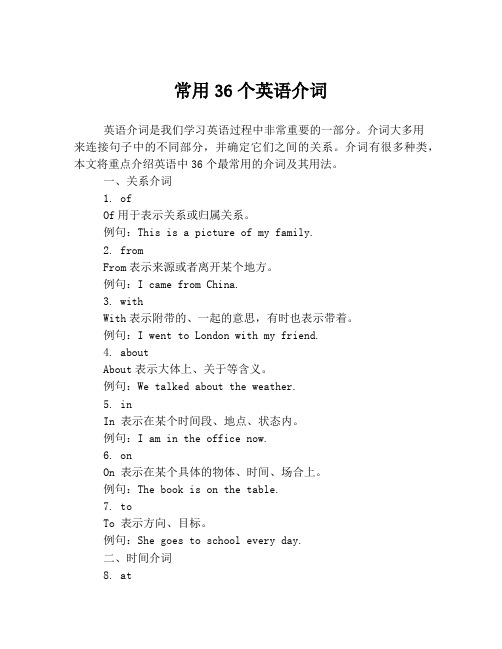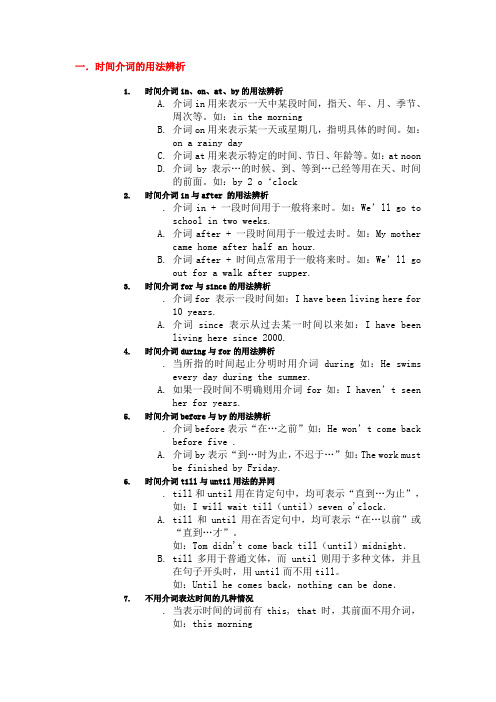英语常用介词用法与例句辨析
英语介词的用法

⑴时间或地点介词in、on、at的用法区别:表示时间时, in表示在一段时间里(在将来时句子中则表示在一段时间之后), on表示在具体的某一天或者某天的上下午等, at表示在某个时刻或者瞬间;表示地点时, in表示在某个范围之内, on表示在某个平面上或与一个面相接触,at则表示在某个具体的场所或地点。
如:He was born on the morning of May 10th.(他出生于五月十日的早晨)/ I usually get up at 7:00 in the morning.(我通常在早上的七点钟起床) / His glasses are right on his nose.(他的眼镜就架在他的鼻子上)/ He is at the cinema at the moment.(此刻他正在电影院)⑵after与in表示时间的用法区别:“after+(具体时刻/从句)”表示“在…时刻之后”常用于一般时态;“in+(一段时间)”表示“在(多久) 之后”,常用于将来时态。
如:He said that he would be here after 6:00.(他说他六点钟之后会来这儿)/ My father is coming back from England in about a month.(我父亲大约一个月以后从英国回来)⑶since与for表示时间的用法区别:“since+(具体时刻/that-从句)”表示“自从…起一直到现在”,“for +(一段斶间)”表示“总共有…之久”,都常用于完成时态;如:Uncle Li has worked in this factory since 1970.(李叔叔自从1970年起就在这家工厂工作了)/ Uncle Li has worked in this factory for over 30 years. (李叔叔在这家工厂已经工作了30多年)⑷by、in与with表示方式的用法区别:都可以表示“工具、手段”,但是by主要表示“乘坐”某个交通工具或“以……方式”,在被动句中可以表示动作的执行者;in 表示“使用”某种语言/文字,with表示“使用”某个具体的工具、手段。
介词的常见用法与例句分析

介词的常见用法与例句分析介词是英语语法中十分重要的一部分,用来表示各种关系,连接其他词或短语。
在句子中,介词通常位于名词、代词、动词、形容词或副词之前,并指示它们之间的关系。
本文将介绍常见的介词用法,并给出相应的例句分析。
一、表示时间关系的介词1. "at"用于表示具体的时间点:- I will meet you at 7 o'clock.- We're having a party at the weekend.2. "on"用于表示具体的日期或星期:- She was born on January 1st, 1990.- We have a meeting on Monday.3. "in"用于表示较长的时间段:- I will finish this project in a month.- He went to Australia in 2010.二、表示地点关系的介词1. "in"表示大的范围或区域内:- The library is in the city center.- She lives in the United States.2. "on"表示接触或靠在某个表面上:- The book is on the table.- The picture is on the wall.3. "at"表示准确的位置:- I'm waiting for you at the bus stop.- They met at the park.三、表示移动方向的介词1. "to"表示向一个地点或目的地移动:- She walked to the store.- He is going to Paris.2. "from"表示从一个地点离开:- They came from Japan.- He returned from school.3. "through"表示穿过或经由某处:- We walked through the forest.- The road goes through the mountains.四、表示原因或目的的介词1. "for"表示目的或原因:- We go to school for education.- She bought flowers for her mother.2. "because of"表示因为:- The game was canceled because of the rain. - He was late because of the traffic jam.3. "with"表示伴随:- He went to the party with his friends.- She took a walk with her dog.五、表示方式或手段的介词1. "by"表示通过某种方式或手段:- We can travel by car.- He learned English by watching movies. 2. "with"表示使用某物或与某人合作:- He writes with a pen.- She painted the picture with watercolors.六、表示比较或对比的介词1. "than"表示比较级:- She is taller than her sister.- It's colder today than yesterday.2. "as"表示相同程度或相似性:- He is as tall as his father.- This book is as interesting as the previous one.七、其他常用介词1. "of"表示所属关系或材料:- The top of the mountain is covered with snow.- She made a doll out of clay.2. "at"表示注意或特定情况下:- Look at the beautiful sunset!- He was surprised at the news.3. "to"表示关系或方向:- She is nice to her colleagues.- He gave the book to me.总结:通过以上介词的常见用法与例句分析,我们可以看到介词在句子中承担着重要的作用,帮助我们准确表达时间、地点、移动方向、目的、方式、比较等关系。
介词英语词汇大全掌握地点和关系的灵活运用

介词英语词汇大全掌握地点和关系的灵活运用介词在英语语法中起到连接词与词之间关系的作用,它们可以用于表示地点、方向、时间、原因、目的、手段等。
准确运用英语介词的知识能够使我们的表达更加准确清晰。
本文将为大家介绍常用的地点和关系介词的用法和例句,帮助大家更好地掌握介词的用法并能够在实际运用中灵活应用。
一、地点介词1. in:在...之内例句:- She lives in London.(她住在伦敦。
)- The book is in the bag.(书在袋子里。
)2. on:在...表面例句:- The picture is on the wall.(这幅画在墙上。
)- I put my keys on the table.(我把钥匙放在桌子上。
)3. at:在...的位置/地点例句:- We meet at the park every Sunday.(我们每个星期天在公园见面。
)- The meeting is at 8 o'clock.(会议在8点举行。
)4. under:在...下面例句:- The cat is sleeping under the table.(猫正在桌子下面睡觉。
)- The book is under the bed.(书在床下。
)5. beside:在...旁边例句:- There is a tree beside the house.(房子旁边有一棵树。
)- She sat beside me during the concert.(演唱会期间她坐在我旁边。
)6. between:在...之间例句:- The library is between the school and the bank.(图书馆在学校和银行之间。
)- She couldn't decide between the blue dress and the red one.(她无法决定穿蓝裙子还是红裙子。
九类英语介词用法辨析

九类英语介词用法辨析一、表示方位的介词:in, to , on1. in表示在某地范围之内。
Shanghai is / lies in the east of China. 上海在中国的东部。
2. to表示在某地范围之外。
Japan is / lies to the east of China. 日本位于中国的东面。
3. on表示与某地相邻或接壤。
Mongolia is / lies on the north of China. 蒙古国位于中国北边。
二、表示计量的介词:at, for, by1. at表示“以......速度”“以......价格”(at表示单价)。
It flies at about 900 kilometers an hour. 它以每小时900公里的速度飞行。
I sold my car at a high price. 我以高价出售了我的汽车。
2. for表示“用......交换”“以......为代价”(for表示总钱数)。
He sold his car for 500 dollars. 他以五百美元把车卖了。
3. by表示“以......计”,后跟度量单位。
They paid him by the month. 他们按月给他计酬。
Here eggs are sold by weight. 在这里鸡蛋是按重量卖的。
三、表示材料的介词: of, from, in1. of成品仍可看出原料。
This box is made of paper. 这个盒子是纸做的。
2. from成品已看不出原料。
Wine is made from grapes. 葡萄酒是葡萄酿成的。
3. in表示用某种材料或语言。
Please fill in the form in pencil first. 请先用铅笔填写这个表格。
They talk in English. 他们用英语交谈。
四、表示工具或手段的介词:by, with, on1. by用某种方式,多用于交通。
常用36个英语介词

常用36个英语介词英语介词是我们学习英语过程中非常重要的一部分。
介词大多用来连接句子中的不同部分,并确定它们之间的关系。
介词有很多种类,本文将重点介绍英语中36个最常用的介词及其用法。
一、关系介词1. ofOf用于表示关系或归属关系。
例句:This is a picture of my family.2. fromFrom表示来源或者离开某个地方。
例句:I came from China.3. withWith表示附带的、一起的意思,有时也表示带着。
例句:I went to London with my friend.4. aboutAbout表示大体上、关于等含义。
例句:We talked about the weather.5. inIn 表示在某个时间段、地点、状态内。
例句:I am in the office now.6. onOn 表示在某个具体的物体、时间、场合上。
例句:The book is on the table.7. toTo 表示方向、目标。
例句:She goes to school every day.二、时间介词8. atAt 表示时间的具体点,通常与钟表时间连用。
例句:I will meet you at 2 o'clock.9. onOn 表示在某个具体的时间点。
例句:My birthday is on May 1st.10. inIn 表示在某个时间段内。
例句:I will return to China in six months.三、方向介词11. in front ofIn front of 表示前面。
例句:There are two chairs in front of the desk.12. behindBehind 表示后面。
例句:The cat is hiding behind the sofa.13. aboveAbove 表示在上方。
例句:The sun is above the clouds.14. belowBelow 表示在下方。
英语介词的使用

一.时间介词的用法辨析1.时间介词in、on、at、by的用法辨析A.介词in用来表示一天中某段时间,指天、年、月、季节、周次等。
如:in the morningB.介词on用来表示某一天或星期几,指明具体的时间。
如:on a rainy dayC.介词at用来表示特定的时间、节日、年龄等。
如:at noonD.介词by表示…的时候、到、等到…已经等用在天、时间的前面。
如:by 2 o‘clock2.时间介词in与after 的用法辨析.介词in + 一段时间用于一般将来时。
如:We’ll go toschool in two weeks.A.介词after + 一段时间用于一般过去时。
如:My mothercame home after half an hour.B.介词after + 时间点常用于一般将来时。
如:We’ll goout for a walk after supper.3.时间介词for与since的用法辨析.介词for 表示一段时间如:I have been living here for10 years.A.介词since 表示从过去某一时间以来如:I have beenliving here since 2000.4.时间介词during与for的用法辨析.当所指的时间起止分明时用介词during如:He swimsevery day during the summer.A.如果一段时间不明确则用介词for如:I haven’t seenher for years.5.时间介词before与by的用法辨析.介词before表示“在…之前”如:He won’t come backbefore five .A.介词by表示“到…时为止,不迟于…”如:The work mustbe finished by Friday.6.时间介词till与until用法的异同.till和until用在肯定句中,均可表示“直到…为止”,如:I will wait till(until)seven o'clock.A.till和until用在否定句中,均可表示“在…以前”或“直到…才”。
介词 常用介词的用法和搭配
介词常用介词的用法和搭配介词:常用介词的用法和搭配介词是语法中一种重要的词类,它用来表示名词或代词与其他词之间的关系。
在英语中,有很多常用的介词及其搭配用法。
本文将详细介绍一些常用介词的用法和搭配,以帮助读者更好地理解和运用介词。
1. of介词“of”表示所属关系、材料、特征等。
例如:- 表示所属关系:the book of John(约翰的书)- 表示材料:a cup of tea(一杯茶)- 表示特征:a man of wisdom(一位有智慧的人)2. in介词“in”表示在某个地点或范围内。
例如:- 在地点上:in the park(在公园里)- 在范围内:in the past(在过去)3. on介词“on”表示在某个特定的位置或表面上。
例如:- 在特定位置上:on the table(在桌子上)- 在表面上:write on the paper(在纸上写)4. at介词“at”表示在某个具体的地点。
例如:- 在具体地点上:at the cinema(在电影院)- 在具体时间上:at 8 o'clock(在8点钟)5. to介词“to”表示移动或方向。
例如:- 表示移动:go to school(去学校)- 表示方向:face to the north(面向北方)6. for介词“for”表示目的、代替和持续时间。
例如:- 目的:buy flowers for my mother(为我妈妈买花)- 代替:substitute A for B(用A代替B)- 持续时间:wait for 10 minutes(等待10分钟)7. with介词“with”表示伴随、拥有和方式。
例如:- 伴随:walk with a friend(与朋友一起散步)- 拥有:a house with a garden(带花园的房子)- 方式:write with a pen(用钢笔写)8. by介词“by”表示通过某种方式或手段。
介词的用法和意思
介词的用法和意思一、介词的基本概念及作用介词是英语中非常重要的一类词性,可以用来引导短语,帮助语言实现更准确、丰富的表达。
作为一种连接词,它可以在句子中起到连接名词、代词、动词等不同成分的作用。
下面我们将详细介绍介词的用法和意思。
二、表示时间的介词1. at:表示具体时间点或某个时刻(如at 9 o'clock,在九点钟)。
例句:I usually have dinner at 7 o'clock.(我通常在7点钟吃晚餐。
)2. in:表示较长时间段或将来某个时间(如in three days,三天后;in the morning,在早晨)。
例句:He will arrive in two weeks.(他将会在两周后到达。
)3. on:表示星期几或具体日期(如on Monday,在星期一;on May 1st,在五月一号)。
例句:We have a meeting on Friday.(我们星期五有个会议。
)三、表示地点的介词1. in:表示大范围地理位置(如in China,在中国;in the city,在城市里)。
例句:She lives in New York City.(她住在纽约市。
)2. at:表示小范围地理位置(如at the park,在公园里;at the bus stop,在车站)。
例句:I met her at the airport.(我在机场遇见了她。
)3. on:表示具体表面(如on the table,在桌子上;on the wall,在墙上)。
例句:The book is on the shelf.(书在书架上。
)四、表示方式的介词1. by:表示通过某种方式或交通工具(如by car,乘坐汽车;by email,通过邮件)。
例句:I usually go to work by subway.(我通常乘坐地铁去上班。
)2. with:表示使用某物或与某人一同完成某事(如with a pen,用钢笔;with my friends,和我的朋友一起)。
英语介词的用法归纳
英语介词的用法归纳英语介词是连接词汇与词汇,短语与短语之间,在句子中起到连接作用的词类。
它们用来确定词与词、短语与短语之间的关系,并表示时间、空间、原因、目的、手段、方式等等。
英语语法中常见的介词有约40多个,下面将对常见的英语介词进行归纳总结,以供参考。
一、表示时间的介词:1. at:表示具体的时间点,通常与表示时间的名词连用;也可表示某些特定的固定日、节日或场所。
例句:at 6 o'clock, at sunrise, at school2. in:表示较长的时间段、季节、月份、年、部门和地方等。
例句:in summer, in 2019, in London3. on:表示具体的某一天或某一天的上午/下午/晚上等。
例句:on Monday, on the morning of May 1st4. by:表示“最晚”、“到”的意思,通常表示某个时间点之前。
例句:by 10 o'clock, by the end of the year5. for:表示持续的时间段,通常与表示时间的名词连用。
例句:for three hours, for a week二、表示空间的介词:1. in:表示在某个或某些三维空间范围之内,也可表示在某个具体的区域或地点。
例句:in the room, in the park2. on:表示在某个平面面上,通常用来表示地点。
例句:on the table, on the wall3. at:表示在某个具体的地点或位置。
例句:at the door, at the bus stop4. by:表示“靠近”、“经过”等含义。
例句:by the river, by the window5. between:表示在两个或两个以上的物体或位置之间。
例句:between two mountains, between the buildings6. among:表示在三个或三个以上的物体或位置之间。
介词用法详解常见介词的正确搭配与固定搭配
介词用法详解常见介词的正确搭配与固定搭配介词是英语语法中非常重要的一部分,它用来表示名词、代词或动词与其他词之间的关系。
正确使用介词能够使语言更加地准确、自然。
本文将详细介绍一些常见介词的正确搭配与固定搭配,以帮助读者更好地理解和掌握这些用法。
一、关于in的用法:1. 表示地点:in表示在某个范围、界限或地方之内。
例如:in the park(在公园里)、in the room(在房间里)。
2. 表示时间:in常用来表示具体的某个时间段。
例如:in the morning(在上午)、in the summer(在夏季)。
3. 表示状态、情感:in用于表示某种状态或情感。
例如:in love(恋爱中)、in a hurry(匆忙)。
二、关于on的用法:1. 表示位置:on用于描述某事物所在的位置或表面。
例如:on the table(在桌子上)、on the wall(在墙上)。
2. 表示时间:on主要用于表示某一天、星期或具体的时间点。
例如:on Monday(在星期一)、on Christmas Day(在圣诞节)。
3. 表示方式、状态:on常用来表示某种方式或状态。
例如:on foot (步行)、on fire(着火)。
三、关于at的用法:1. 表示地点:at用于表示具体的某个地点或位置。
例如:at the airport(在机场)、at the bus stop(在公交车站)。
2. 表示时间:at用于表示具体的某一时刻。
例如:at 8 o'clock(在8点钟)、at midnight(在午夜)。
3. 表示某种状态、情感:at常用来表示某种状态或情感。
例如:at peace(和平)、at a loss(困惑)。
四、关于to的用法:1. 表示方向、目的地:to用于表示某个方向或目的地。
例如:go to school(去学校)、fly to Beijing(飞往北京)。
2. 表示时间:to用于表示某个时间点或一段时间之后。
- 1、下载文档前请自行甄别文档内容的完整性,平台不提供额外的编辑、内容补充、找答案等附加服务。
- 2、"仅部分预览"的文档,不可在线预览部分如存在完整性等问题,可反馈申请退款(可完整预览的文档不适用该条件!)。
- 3、如文档侵犯您的权益,请联系客服反馈,我们会尽快为您处理(人工客服工作时间:9:00-18:30)。
英语常用介词用法与例句辨析表示方位的介词:in, to, on1. in 表示在某地范围之内。
如:Shanghai is/lies in the east of China.lies[lais]位于上海在中国的东部。
2. to 表示在某地范围之外。
如:Japan is/lies to the east of China.日本位于中国的东面。
3. on 表示与某地相邻或接壤。
如:Mongolia is/lies on the north of China.蒙古国位于中国北边。
表示计量的介词:at, for, by1. at表示“以……速度”“以……价格”。
如:It flies at about 900 kilometers a hour.flies[flaɪz]飞(fly的第三人称单数)它以每小时900公里的速度飞行。
I sold my car at a high price.sold [soʊld]( sell的过去式和过去分词)出卖; 卖,售,销price[praɪs]价格,价钱;我以高价出售了我的汽车。
2. for表示“用……交换,以……为代价”。
如:He sold his car for 500 dollars.他以五百元把车卖了。
注意:at表示单价(price) ,for表示总钱数。
3. by表示“以……计”,后跟度量单位。
如:They paid him by the month.他们按月给他计酬。
Here eggs are sold by weight.在这里鸡蛋是按重量卖的。
表示材料的介词:of, from, in1. of成品仍可看出原料。
如:This box is made of paper.这个盒子是纸做的。
2. from成品已看不出原料。
如:Wine is made from grapes.葡萄酒是葡萄酿成的。
3. in表示用某种材料或语言。
如:Please fill in the form in pencil first.请先用铅笔填写这个表格。
They talk in English.他们用英语交谈。
注意:in指用材料,不用冠词;而with指用工具,要用冠词。
请比较:draw in pencil/draw with a pencil。
表示工具或手段的介词:by, with, on1. by用某种方式,多用于交通。
如:by bus乘公共汽车,by e-mail. 通过电子邮件。
注意:表示搭乘交通工具时,用by时不用冠词,用in时要用冠词。
请比较:I went there by bus/in a bus.我是坐公共汽车去的那儿。
2. with表示“用某种工具”。
如:He broke the window with a stone.他用石头把玻璃砸坏了。
注意:with表示用某种工具时,必须用冠词或物主代词。
3. on表示“以……方式”,多用于固定词组。
They talked on the telephone.他们通过电话进行交谈。
She learns English on the radio/on TV.她通过收音机/电视学英语。
表示关于的介词:of, about, on1. of仅是提到或谈到过某人或某事。
如:He spoke of the film the other day.他前几天提到了这部影片。
He thought about this matter yesterday.thought [θɔt]想( think的过去式和过去分词); 思索他昨天考虑了这件事。
2. about指“关于”某人或某事物的较详细的情况。
如:Can you tell me something about yourself?你能告诉我一些关于你自己的事情吗?3. on指“关于”学术性的或严肃的事。
如:It’s a textbook on the history of china.它是一本有关中国历史的教科书。
表原因或理由的介词:for, at, from, of, with, by, because of1. for表示原因,常与sorry, famous, punish, praise, thank, blame等词连用。
如:I am sorry for what I said to you.我后悔不该对你讲那些话。
2. at指情感变化的原因,意为“因听到或看到而……”。
如:He was surprised at the news.surprised[sərˈpraɪzd]惊讶的; 惊奇的; 觉得奇怪的; 感觉意外的听到这消息他大吃一惊。
3. from指“外在的原因”,如受伤、车祸等。
如:He died from the wound.wound[waʊnd]伤; 伤害; “wind”的过去式和过去分词他因受伤而致死。
4. of指“内在的原因”,如病、饿等。
如:The old man died of hunger.老人死于饥饿。
5. with指生理上或情感上的由外界到内心的原因。
如:Hearing the news, he jumped with joy.他们听到这个消息,欣喜若狂。
He was shaking with anger.shaking [ˈʃekɪŋ]抖动的,发抖的,颤抖的anger[ˈæŋɡɚ]愤怒; 怒气; 生气; 愤懑他气得浑身发抖。
6. by表示外部的,尤其是暴力的或无意中造成某种结果的原因。
Her body was bent by age.他因年老背弯了。
She took your umbrella by mistake.我因弄错拿了你的雨伞。
7. because of 表示引起结果的直接原因。
如:He retired last month because of illness/because he ill.他上个月因为生病退休了!8. owing to多表示引起某不良后果的原因。
如:Owing to the rain they could not come.由于下雨他们没来。
9. thanks to表示引起某种幸运结果的原因,常译为“幸亏……,多亏……”。
如:Thanks to John, we won the game.多亏约翰,我们才赢了这场比赛。
10. out of表示动机的起因,常译为“出于……”。
如:He asked the question out of curiosity.他出于好奇才问了那个问题。
11. through多表示因局部而影响全局的原因。
如:The war was lost through bad organization.战争因组织不周而失败了。
表示好像或当作的介词:like, as1. like表示“像……一样”,其实不是。
如:Peter the Great, like his country, was strong and proud.彼得大帝像他的国家一样强健和自豪。
2. as表示“作为,以……身份”,其实也是。
如:He talked to me as a father.他以父亲的身份跟我谈话。
注:as作连词时,可表示“好像……”。
如:The work is not so difficult as you imagin.这工作不像你想像的那么困难。
表示支持或反对的介词:against, foragainst反对,for支持,互为反义词。
如:Are you for my idea or against it?你赞同还是反对我的想法?表示除某人某物外的介词:besides, except1. besides是包括后面所提人或物在内的“除……外,还”。
如:Thirty students went to the cinema besides him.除他以外,还有30个学生去看了电影。
(他和另外30人都去了)He is interested in tennis besides(=as well as)football.除了足球,他还对网球感兴趣。
2. except是指不包括后面所提人或物在内的“除去”。
如:Everyone is excited except me.除我以外的每个人都很激动。
(他们激动,而我却不激动)All the visitors are Japanese except him.除他以外的所有游客都是日本人。
(其他人是日本人,可他不是)注意:(A) except通常与表示全体的all, every连用;若与other连用,只能用besides。
如:He had other people to take care of besides me.除我之外,他还要照顾别人。
(B) except是排除同类;而except for是排除非同类,常在说明基本情况后,从细节上加上修正。
如:The composition is very good except for a few spelling mistakes.除了几处拼写错误之外,这篇作文整体还是不错的。
(作文与拼写错误是非同类的)但except for 有时也可代替except,特别是在句首时,因为except 是不能用于句首的。
如:Except for George, you can all go.除乔治外,你们都可以去。
